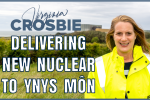Last December I was honoured to become Ynys Môn’s first Conservative MP for more than 30 years. The last woman to hold the post was the great Megan Lloyd-George, the country’s first-ever female MP.
National issues do not always have a direct impact on elections. On Anglesey, it is a collection of island people with island concerns. Yet, being on the periphery by no means justifies such a beautiful place being treated as such.
In recent times, key to winning the seat for any prospective candidate is unequivocal, unwavering support for Wylfa Newydd Nuclear Power Plant, and this was a core part of my promise to the electorate.
New nuclear projects can help to deliver so many of our current national priorities: a Net Zero electricity supply; deep decarbonisation in other key parts of the energy system; driving economic growth outside of the south east of England; and renewal of our national critical infrastructure.
However, in January 2019, Hitachi decided to suspend activities, and since then the project has been hanging in the balance.
Wylfa Newydd is to be the catalyst for a massive levelling up of the whole of North Wales, something which the region has not experienced since the first power station was built in the 1960s. Put simply, it would be a monumental blow both locally and nationally if this project does not go ahead.
Beyond Ynys Môn, Wylfa Newydd is of national critical importance in order to stand any chance of meeting Net Zero by 2050. During this decade, all but one of our current nuclear power plants, which provide 40 per cent of our low carbon electricity, are due to come offline. Without clear alternatives, and with a need to meet demand, nuclear must be replaced with nuclear.
Complicating matters is the Committee on Climate Change’s (CCC) forecast that demand for clean electricity is to quadruple over the next thirty years. Meeting this will require a massive expansion of our already world-leading offshore wind capability, developing more onshore wind, and enabling solar farm development.
Likewise, while much has been made by critics of the so-called end of baseload, the CCC has affirmed we will still need ‘firm’ power on the Grid to complement variable renewables. The same conclusion has been reached by many organisations central to this issue including the International Energy Agency, the OECD, National Grid, the Energy Systems Catapult, and the Massachusetts Institute of Technology.
Therefore, maintaining a 40 per cent share for nuclear is the key to success. The question is, how do we achieve it?
Recently the Nuclear Industry Association (NIA) published ‘Forty by ’50: The Nuclear Roadmap’. The report not only details how much nuclear power will be required to decarbonise electricity, but also for our entire energy system.
As a scientist myself, I know what complex a task this will be. That is why I was the first MP to raise the significant potential role of nuclear in hydrogen production in the Commons last week.
It is expected of politicians that we pursue the pathway which has the highest probability of success at the lowest cost. The best way to achieve our climate change targets without unnecessarily spending billions of taxpayer’s money, is to ensure projects such as Wylfa Newydd go ahead.
The German Energiewende model shows the danger of taking an ‘either/or’ approach to low carbon technologies. This system has seen hundreds of billions of euros ploughed into an energy system which is no cleaner than it was ten years ago. Why? Because they have shut down the vast majority of their nuclear power plants, with the rest not far behind. Replacing it when intermittency inevitably kicks in is lignite coal from open cast mines, pretty much the dirtiest way to make electricity.
The Net Zero target is so great that we need a combination of renewables and nuclear – which, as the IPCC themselves have set out, has a carbon footprint the same or lower than wind and solar – to be working together in order to successfully meet it.
This is about international credibility and leadership, and setting a blueprint for the rest of the world in how to successfully decarbonise an economy. That is why I will be pushing the Government to consider the recommendations set out in the NIA’s report – because without their implementation, we are making the Net Zero target a much greater mountain to climb.


